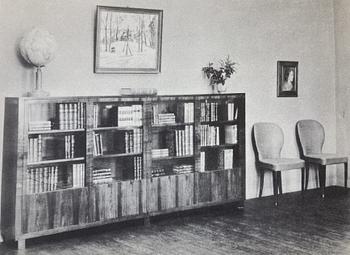Carl Malmsten
a walnut bookcase, Sweden, 1930s.
Four glass doors with underlying adjustable shelves, on crosswise feet, branded CM underneath. Length 251 cm, depth 32 cm, height 120.5 cm.
Wear, some loss of veneer and water stains. Avainet sisältyvät.
Näyttelyt
The model was introduced at the housing and furnishings exhibition "Standard 1934" at Liljevalchs in Stockholm in 1934.
Kirjallisuus
Carl Malmsten, "Schwedische Möbel", Wepf & Co. 1954, model illustrated p. 35.
Suunnittelijat
Carl Malmsten is one of Sweden's most famous furniture designers. Many of his furniture are considered modern design classics, for example, the cane chair "Lilla Åland", the armchair "Farmor", the sofa "Samsas", the cabinet "Herrgården", and the furniture series "Vardag".
Both "Lilla Åland" and "Vardag" adopted the ideals of "beautiful everyday goods" of the 1940s. Their neat shape and frugal design quickly became timeless interior details that we still see in many homes today.
At the beginning of his career, Malmsten interned at various carpentry workshops and studied furniture at Nordiska museet and Skansen. He had his breakthrough in 1916 when he was commissioned to design part of the interior of Stockholm's City Hall.
During his career, Malmsten collaborated with several architects, such as Ragnar Östberg, Ivar Tengbom, and Ferdinand Boberg. He designed furniture for Stockholm's concert hall and Ulriksdal castle. He participated in the now iconic hosing exhibition at Liljevalchs gallery in 1917, where the term "Beautiful everyday goods" was coined.



























































